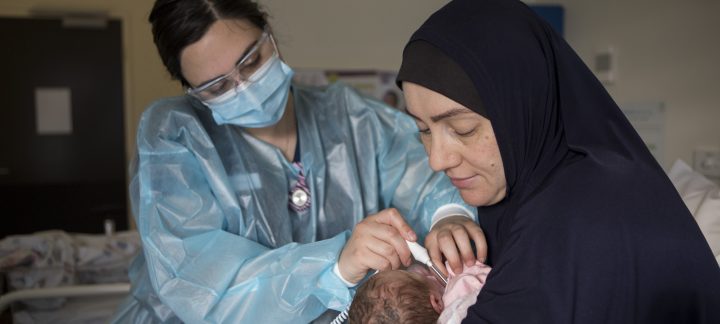Mercy Health seeks to improve the health and wellbeing of everyone who accesses our services, particularly the most vulnerable such as migrants and refugees. We seek to partner with communities so that we can develop more effective, meaningful and culturally responsive services.
For example, our Healthy Eating for Gestational Diabetes information sheets were developed in collaboration with women from Arabic, Chinese, Persian and Vietnamese communities. These culturally adapted, plain language, bilingual information sheets are provided to women during language specific education sessions.
In late 2019, a study conducted in partnership with the University of Melbourne, HealthWest Partnership and the Centre for Culture, Ethnicity and Health showed that these information sheets combined with education sessions have made a significant difference in helping women from these backgrounds manage their gestational diabetes. More specifically, women reported (through a certified interpreter):
- reduced anxiety — “Reduced worry in me and my family and it helped me eating food – proper portions – as I did not know it.” (Persian participant)
- increased confidence — “My confidence has increased as the information is very useful; by following the information I divide meals into six times a day and my sugar levels have reduced.” (Vietnamese participant)
- changed food portions, choices and meal plans — “Meal plans are very useful – has lot of info – sample menu is very specific and I can… copy meal plan.” (Chinese participant)
- increased knowledge and skills — “The information we received will help us to manage gestational diabetes and not turn into type 2 diabetes, and if I decide to have another child it will still be in my mind.” (Arabic participant)
- positive flow-on effect to family and friends — “Shared it with lots of my friends as a way to reduce weight – a diet guide.” (Chinese participant).
This feedback demonstrates the value of developing culturally adapted health information and education resources and not just translations of mainstream concepts, resources and information.
The findings have been published in the report – Understanding the Impact of Organisational Health Literacy Initiatives on Clients
Our interpreting services
In 2019/20 Mercy Health provided over 16,000 interpreting services across our sites. The demand continues to grow, as does the range of languages spoken by people who access our services.
Across both Mercy Hospital for Women and Werribee Mercy Hospital, 74.5 per cent of patients who needed an interpreter received one.
The top 10 languages for interpreting are:
| Mandarin |
| Arabic |
| Vietnamese |
| Karen |
| Greek |
| Punjabi |
| Italian |
| Hindi |
| Persian |
| Macedonian |
We have developed a new information sheet Interpreting Services at Mercy Hospitals to encourage our community to access interpreters. It has been translated into the four most common languages with more translations currently in development.
Our Multicultural Services team continues to provide training and other resources to ensure staff can appropriately respond to the diverse needs of people who access our services.
In addition, Mercy Health has committed to the priority goal of ‘ensuring accredited interpreters are provided when needed’ as listed in Safer Care Victoria’s Partnering in Healthcare Framework. This framework applies to all Victorian public health services. To read more about the framework please visit www.bettersafercare.vic.gov.au.
You have a right to ask for an interpreter if you or your family:
- find it hard to communicate in English or
- use a form of sign language such as Auslan.
Arabic

Chinese

Karen

Persian





